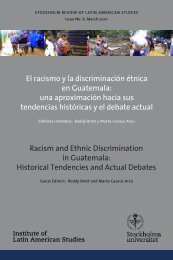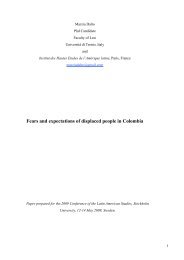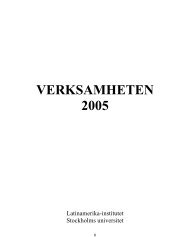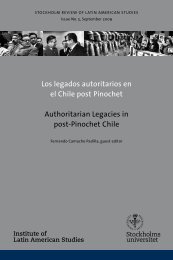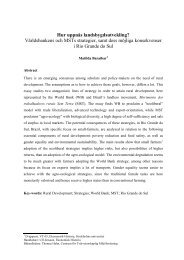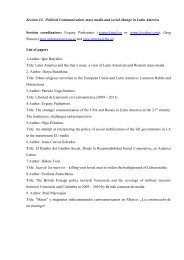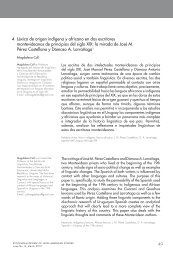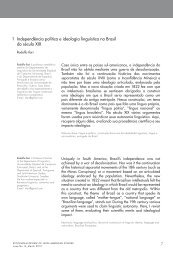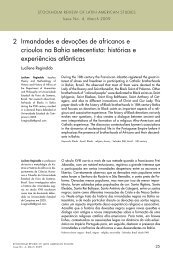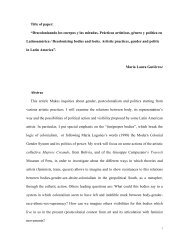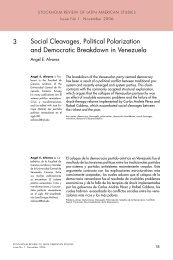Venezuelan Politics and Society in Times of Chavismo PolÃtica y ...
Venezuelan Politics and Society in Times of Chavismo PolÃtica y ...
Venezuelan Politics and Society in Times of Chavismo PolÃtica y ...
You also want an ePaper? Increase the reach of your titles
YUMPU automatically turns print PDFs into web optimized ePapers that Google loves.
Has <strong>Venezuelan</strong> Decentralization Sur vived <strong>Chavismo</strong><br />
Rickard O. Lal<strong>and</strong>er<br />
(<strong>and</strong> rema<strong>in</strong>) reflected <strong>in</strong> the party system. Municipal<br />
<strong>and</strong> regional political authorities, pr<strong>in</strong>cipally<br />
the mayors <strong>and</strong> the governors, are generally recognized<br />
<strong>and</strong> have dem<strong>and</strong>ed (with different outcomes)<br />
the transfer <strong>of</strong> authorities, responsibilities<br />
<strong>and</strong> rights from central political control. Likewise,<br />
it is important to underl<strong>in</strong>e that the <strong>Venezuelan</strong><br />
people seem to be satisfied with the changes related<br />
to decentralization. José Mol<strong>in</strong>a shows that<br />
the great majority <strong>of</strong> <strong>Venezuelan</strong>s have a positive<br />
attitude towards decentralization (Mol<strong>in</strong>a, 2000:<br />
14). 9 In the context <strong>of</strong> the current political situation<br />
<strong>of</strong> the Chávez government, research on <strong>Venezuelan</strong><br />
public op<strong>in</strong>ion <strong>and</strong> political culture reveals that the<br />
majority <strong>of</strong> people, <strong>in</strong>clud<strong>in</strong>g those <strong>in</strong> the <strong>Chavismo</strong><br />
movement, defend the exist<strong>in</strong>g decentralization system<br />
(Carrasquero & Welsch, 1999: 43-44). But, a<br />
relatively large number <strong>of</strong> <strong>Chavismo</strong> politicians are<br />
<strong>in</strong> favor <strong>of</strong> abolish<strong>in</strong>g the autonomy <strong>of</strong> the governorships,<br />
while at the same time they promote <strong>in</strong>creased<br />
authorities for the municipal level. It is also<br />
noteworthy that dur<strong>in</strong>g the electoral campaigns <strong>of</strong><br />
1999 <strong>and</strong> 2000, practically all c<strong>and</strong>idates (<strong>in</strong>clud<strong>in</strong>g<br />
President Chávez) presented themselves as the<br />
defenders <strong>of</strong> the “adequate” cont<strong>in</strong>uation <strong>of</strong> the decentralization<br />
processes. Decentralization has been<br />
<strong>in</strong>cluded <strong>in</strong> the discourses <strong>of</strong> all political parties <strong>and</strong><br />
leaders (Lal<strong>and</strong>er, 2004 a & b;de la Cruz, 2004).<br />
Even if decentralization has caused conflicts <strong>and</strong><br />
controversies (as all k<strong>in</strong>ds <strong>of</strong> power transfer do), a<br />
great majority <strong>of</strong> the local, regional <strong>and</strong> national<br />
political leaders consider decentralization irreversible.<br />
Another relevant factor that speaks <strong>in</strong> favor <strong>of</strong><br />
the decentralized system is the strong identification<br />
<strong>of</strong> <strong>Venezuelan</strong>s with their particular regional state.<br />
From certa<strong>in</strong> perspectives, it could be easy to<br />
reach the conclusion that centralization, first under<br />
Caldera <strong>and</strong> then under Chávez, seems to demonstrate<br />
that the tradition <strong>of</strong> centralism <strong>in</strong> Venezuela<br />
is still alive <strong>and</strong> well. But this can perhaps be traced<br />
rather to socio-economic factors than to tradition.<br />
Decentralization has accentuated social differences<br />
s<strong>in</strong>ce the creation <strong>of</strong> new municipalities such as<br />
Chacao, Baruta, <strong>and</strong> elsewhere, which meant fewer<br />
resources for big cities <strong>and</strong> a privileged status for<br />
those liv<strong>in</strong>g <strong>in</strong> the “suburbs.” On the other h<strong>and</strong>,<br />
decentralization has stimulated the advent <strong>of</strong> a<br />
regional leadership, which became relatively <strong>in</strong>dependent<br />
(even if the political parties, both traditional<br />
<strong>and</strong> new, cont<strong>in</strong>ued to dom<strong>in</strong>ate politics) (Ellner,<br />
personal communication; Lal<strong>and</strong>er, 2004 a).<br />
Though decentralization was blocked dur<strong>in</strong>g the<br />
Caldera government <strong>and</strong> political centralism became<br />
further concentrated with the <strong>in</strong>stallation <strong>and</strong><br />
development <strong>of</strong> the Chávez government, there have<br />
been signs <strong>of</strong> attempts to create function<strong>in</strong>g channels<br />
between the center <strong>and</strong> the regions. In January<br />
2000, the Federal Council <strong>of</strong> Government –CFG–<br />
(Consejo Federal del Gobierno) was <strong>of</strong>ficially <strong>in</strong>troduced.<br />
Governors <strong>and</strong> mayors were to be <strong>in</strong>tegrated<br />
with<strong>in</strong> the CFG so they could share their experiences.<br />
The CFG is presided over by the Vice-President<br />
<strong>of</strong> the Republic (who is appo<strong>in</strong>ted by the President)<br />
<strong>and</strong> is further composed, accord<strong>in</strong>g to the law, <strong>of</strong><br />
the cab<strong>in</strong>et m<strong>in</strong>isters, the governors, one mayor per<br />
federal entity <strong>and</strong> representatives <strong>of</strong> civil society.<br />
The CFG aims to provide a form for “coord<strong>in</strong>ation”<br />
<strong>in</strong> which plans are discussed among representatives<br />
<strong>of</strong> the different levels <strong>of</strong> government. Angel Alvarez<br />
suggests that the CFG is one <strong>of</strong> the most important<br />
<strong>in</strong>novations <strong>of</strong> the new constitution. With<strong>in</strong><br />
<strong>Chavismo</strong>, the CFG has provoked emphatically<br />
opposed st<strong>and</strong>po<strong>in</strong>ts. On the one h<strong>and</strong>, National<br />
Assembly deputy Alej<strong>and</strong>ro de Armas has struggled<br />
for tighter boundaries between the executive <strong>and</strong><br />
legislative bodies, oppos<strong>in</strong>g centralized budget control<br />
<strong>in</strong> favor <strong>of</strong> <strong>in</strong>creased f<strong>in</strong>ancial autonomy for the<br />
states. On the other h<strong>and</strong>, former vice-president <strong>of</strong><br />
the Republic Ad<strong>in</strong>a Bastidas proposed a model for<br />
re<strong>in</strong>forc<strong>in</strong>g central State control over expenditures<br />
at regional <strong>and</strong> municipal levels. Likewise, Bastidas<br />
attempted to <strong>in</strong>stitutionally abolish the Inter-Governmental<br />
Decentralization Fund/FIDES (Alvarez,<br />
9 One question <strong>in</strong> the survey was: “Another topic under discussion<br />
is decentralization <strong>and</strong> the leadership <strong>and</strong> government <strong>of</strong><br />
the governors <strong>and</strong> the mayors. Do you th<strong>in</strong>k that decentralization<br />
has been: (1) very good (10.2%); (2) good (62.8%);<br />
(3) bad (22.8%); (4) very bad (4.2%) for the country Valid<br />
cases: 1,311. (Ibid.) See also González de Pacheco, 2000;<br />
Lal<strong>and</strong>er, 2004 a; de la Cruz, 2004.<br />
Stockholm REVIEW OF Lat<strong>in</strong> American Studies<br />
Issue No 1. November 2006<br />
38



